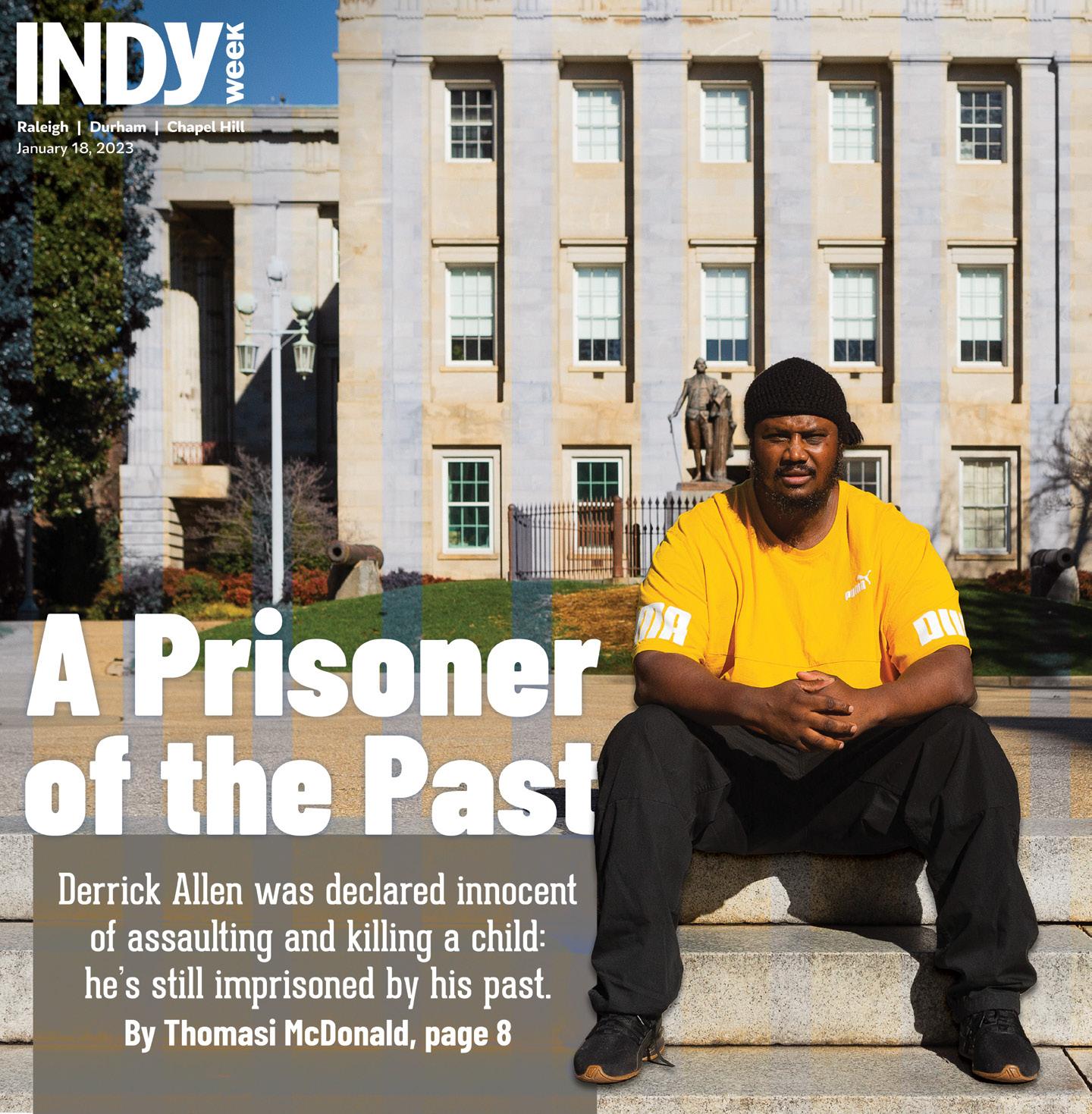
4 The NC Utilities Commission approved a new plan to reduce the state's carbon emissions. Advocates say it leaves a lot to be desired.
BY LISA SORG
8 Derrick Allen was declared innocent of raping and killing a child. He says a pardon from the governor is the only way he can escape his past.
BY THOMASI MCDONALD
10 The World University Games are coming to North Carolina and the Triangle.
BY JASMINE GALLUP
ARTS & CULTURE
12 Durham playwright Tamara Kissane's new play Nice White Parents 2016 hits the stage in Greensboro. BY
14 Mesha Maren's gripping second book, Perpetual West, takes readers from Appalachia to the southern border, exploring all the margins in between.
BY SARAH EDWARDS
16 New Piedmont Laureate Dasan Ahanu ushers in a new literary era, with poetry that burns bright. BY THOMASI MCDONALD

2 January 18, 2023 INDYweek.com
NEWS
BYRON WOODS
CONTENTS Raleigh Durham Chapel Hill VOL. 40 NO. 3 WE MADE THIS PUBLISHER John Hurld EDITORIAL Editor in Chief Jane Porter Managing Editor Geoff West Arts & Culture Editor Sarah Edwards Staff Writers Jasmine Gallup Thomasi McDonald Lena Geller Copy Editor Iza Wojciechowska Interns Chad Knuth, Lia Salvatierra Nathan Hopkins Contributors Spencer Griffith, Brian Howe, Kyesha Jennings, Jordan Lawrence, Glenn McDonald, Nick McGregor, Gabi Mendick, Shelbi Polk, Dan Ruccia, Rachel Simon, Byron Woods CREATIVE Creative Director Nicole Pajor Moore Graphic Designer Izzel Flores Staff Photographer Brett Villena ADVERTISING Publisher John Hurld Sales Digital Director & Classifieds Mathias Marchington CIRCULATION Berry Media Group MEMBERSHIP/ SUBSCRIPTIONS John Hurld INDY Week | indyweek.com P.O. Box 1772 • Durham, N.C. 27702 Durham 320 East Chapel Hill Street, #200 Durham, N.C. 27701 | 919-286-1972 Raleigh: 16 W Martin St, Raleigh, N.C. 27601 EMAIL ADDRESSES first initial[no space]last name@indyweek.com ADVERTISING SALES advertising@indyweek.com Raleigh 919-832-8774 Durham 919-286-1972 Classifieds 919-286-6642 Contents
ZM INDY, LLC All
Material may not be reproduced
permission. THE REGULARS 3 Backtalk | 15 Minutes 17 Culture Calendar The Other Half, a new play by Mark Cornell shows at The ArtsCenter from January 12 to 22. (See calendar, page 17.) PHOTO COURTESY OF THE ARTSCENTER
COVER Photo by Brett Villena / Design by Nicole Pajor Moore
© 2022
rights reserved.
without
B A C K T A L K
Last
This article kept mentioning cost-costcost, but who ultimately pays? If the train system expects to pay off its loans with fares, prepare for a downward cycle of reduced ridership and increasing fares. A county tax can work because of all it will do to benefit road congestion, but good luck convincing the people who don’t commute on the worst roads and who would never benefit from a train ride to pay. Perhaps a commercial tax on all the businesses bringing in all of the people in all of their single passenger cars? This detail seems at least as important as where the tracks and stations go, how often service is, and how the region plans to handle final-mile transport and passenger car parking.
And one from reader KENNETH MOREHEAD, who confuses commuter rail with light rail but makes some points all the same:
The “Stuck in Traffic” article on “light” rail was informative and frustrating. Light rail is a K-line model train! We can do so much better than “light” rail. How about something along the lines of skytran? skytran.com The exponential cost savings will mean the whole population in the Triangle can be served, not just those along the rail line. We can have lines running all over the Triangle, up Guess Road, out Erwin Road, all over Raleigh, to Chapel Hill and Carrboro. This is a solution that could invigorate the local economy (how many times do we forgo a trip into town to eat because of the parking hassle)? No need for school buses or stressful carpooling if there’s a change in school schedules or after school activities. Can’t drive due to vision problems or struggling to get around w/o a car? Duke opts out because of the noise and vibration? Skytran solves all this quickly and we’re off
the petroleum standard. Please—let’s have REAL public transportation for everyone that’s fast, cheap, fun, cool clean and safe!
From our Instagram page:
“Well welcome to the 21st century RTP,” wrote commenter @IDEACURATOR . “Those who are opposed to PUBLIC Transportation need to seriously reevaluate reality. The car is becoming a obsolete burden—high cost gas, high cost to own, the impact on the environment. Yes, SOME people are working remotely but those large corporate campus are calling for ‘hybrid working’. RTP can not call itself progressive or a city without a public train to take you to the airport. Besides there are more money wasted on building more highways, scooters, and autonomous vehicles than a good investment in public transportation. I would say the vision is too small. There should be high speed trains from NYC to Florida straight to down I-95. This would connect the rural to the cities and east coast to south.”
“This would be useful but bypassing Fuquay/ Holly Springs is a big oversight,” wrote @GREENLIGHTFIGHT
Commenter @DOUBL_A_RON is pessimistic: “People won’t use it as intended. No one is leaving their Tesla, Range Rover, or Audi at home to ride public. Status is more important here ”
As is commenter @BRENDAN1963: “This will never happen. RTP has the ‘last mile’ problem with getting passengers from an RTP station to the large company campuses. Add in the new increase of remote working.”
Commenter @ERICBOGGS has a salient question: “Is this post from 2014?”
All jokes aside, we agree that the plan could use some improvement. But building a commuter rail line is undoubtedly an important investment in the region’s future.
Chapel Hill
15 MINUTES
Greg Bower, 57
The Turntable Doc | turntabledoc.com
BY SARAH EDWARDS sedwards@indyweek.com
How long have you been working as The Turntable Doc?
I really started in 2010 when I had a bunch of turntables sitting around that I’d found at thrift stores. The “vinyl revival” hadn’t really gotten started in earnest at that point. I got a bunch of turntables at thrift stores and fixed them up and then I took them to—my friend Jerry Williams runs the Carrboro Record Show—so I took them to the show and people just snatched them up. The guys from All Day Records came by and asked, “Hey, do you fix records?” and I went “I guess I fixed these, so I guess I do?”
How did you learn how to fix them?
My older brother would walk around the house and take everything apart and I would walk around with another screwdriver and figure out how it went back together.
You mentioned the vinyl revival— what have you noticed since that time, in terms of people’s consumption habits?
There’s shops popping up all over the place, so I’d say it’s still working. I look at it this way—there’s this joke in Men in Black where they say, “Now I’ll have to buy The White Album again!” In that joke, physical media was still a thing. We went from physical media to MP3s to streaming, and I think people just went, “Hey—I don’t have anything!” If you’re a fanboy of some band you just love, you want an artifact. I’ve seen people go to record shows that didn’t have turntables and buy records.
I’ve got an LP from 1950 that sounds fantastic. We’re talking about a 73-year-old technology— it’s unheard of that something can last that long as a viable technology product. It’s unheard of. They sound great, they look great. They’re aesthetically pleasing to people—I just don’t think they’re going to go away.
HBO has recently retired some shows suddenly. It seems like there’s a growing awareness that things online might not last forever.
That’s a big deal! People are going to start snatching up DVDs to make sure they have stuff, maybe. People like artifacts.
What are common mistakes people make with their turntables?

I wouldn’t say this is a turntable thing but it is a record thing: cleaning records. It makes a gigantic difference and there’s some simple, low-frills ways of doing it. I have some ways listed on my website, and then you can buy an expensive machine to do it, too—I have an expensive machine. People will listen to records and go, “It’s all noisy and crackly!” But actually, if you clean a record, that gets rid of 80 to 90 percent of that, unless the record is really trash.
Do you remember the first record you bought?
Yes. Elton John’s Captain Fantastic and the Brown Dirt Cowboy. I still love that record.
What is the record-collecting community like, in your experience? Obsessive. Really nice people that are obsessed. W
INDYweek.com January 18, 2023 3
PHOTO BY BRETT VILLENA
An email from reader IAIN BURNETT:
WANT TO SEE YOUR NAME IN BOLD? indyweek.com backtalk@indyweek.com @INDYWeekNC
week, Jasmine Gallup wrote about the Triangle’s plans for a commuter rail system and the challenges that lie ahead in bringing that vision to fruition. Many readers were upset to learn that the proposed rail line won’t extend past Durham to Chapel Hill, especially after the failed attempt to build a light rail line between the town and Durham. They were also incredulous to see that the plans don’t include a stop at RDU Airport. Readers had other thoughts, too.
@indyweek
Falling Short
BY LISA SORG backtalk@indyweek.com
A round six o’clock on the evening of Friday, December 30, when anyone who could be was mentally checked out for the holidays, the North Carolina Utilities Commission dropped one of its most important rulings of the last decade: the 137-page Carbon Plan, the commission’s directive to Duke Energy to drastically reduce its carbon dioxide emissions and to do its part in thwarting a planetary crisis. However, many clean energy and environmental advocates quickly decried the plan as deferential to the utility. “Tragically, the NC Utilities Commission went along with Duke Energy’s massive, climate-wrecking fracked gas expansion,” Jim Warren, executive director of NC WARN, Duke Energy’s perennial nemesis, wrote. “The commission also seemed to go along with Duke’s request to greatly limit new solar projects indefinitely pending billions in new—and likely controversial—transmission projects.”
These projects include small modular nuclear reactors, nascent hydrogen power technology, and additional natural gas resources.
The plan is a requirement under House Bill 951, which Gov. Roy Cooper signed into law in October 2021. It directs the utilities commission to “take all reasonable steps” to reduce carbon dioxide emissions from Duke Energy’s electric generating facilities. The plan sets a goal of 70 percent reduction in carbon emissions by 2030—just seven years from now. And by 2050, Duke Energy should have achieved carbon neutrality.
The commission has the flexibility to delay these benchmarks by up to two years or longer if nuclear or wind power requires more time to be built or to maintain the reliability of the grid.
But the planet is out of runway. Globally, the last eight years have been the warmest on record, according to data
released this week by the European Union’s Copernicus Climate Change Service. Levels of carbon dioxide and methane continue to increase. “For both gases these are the highest concentrations from the satellite record,” the service reported, “and by including other records, the highest levels for over 2 million years for carbon dioxide and over 800,000 years for methane.”
And three of Duke Energy’s proposals prepared in cooperation with Public Staff—the citizens’ representative body that advises the commission—would blow past the 2030 deadline. “While the Commission correctly decided not to decide now to extend the 2030 compliance requirement,” wrote the Southern Environmental Law Center, which represented three clean energy groups in the proceedings, “it adopted the near-term actions proposed by Duke, which are based almost entirely on plans that miss that deadline.”
The Carbon Plan contains other loopholes the size of the Antarctic ozone layer. Environmental justice, for instance, gets short shrift, with just four paragraphs devoted to the issue at the end of the document, as if an epilogue.
Environmental injustice is also baked into the rate disparities between Duke Energy Progress (DEP) and Duke Energy Carolinas (DEC). Although Duke Energy owns both, the cost of electricity is “substantially higher”—by 19 percent—in DEP territory than DEC, the report reads.
Put another way, a household served by DEP that uses 1,000 kilowatt hours per month pays $125.94, while a household in DEC using the same amount of energy pays $106.23.
The DEP service area encompasses 36 entire counties, of which 21 are designated as Tier 1 by the state Department of Commerce as “most distressed” economically. Most DEP territory lies along and east of I-95.
In comparison, of the 31 counties wholly in DEC territory, just six are Tier 1.
(DEP shares coverage with DEC in another dozen counties, three of which are most distressed.)
“The rate difference has increased consistently since Duke and Progress merged in 2012,” the commission wrote in the plan. “This is in part because Duke Energy Progress has more solar and needed transmission and distribution upgrades.”
To address the rate disparity, the utilities commission directed that Duke Energy plan to merge its two systems. This would also spread the costs of carbon reduction and new investments over a larger customer base.
Because of its geography—flat expanses of land—DEP territory will have most of the new solar projects, and customers there “will bear a disproportionate share of the costs to achieve statewide compliance,” the commission wrote.

Duke is scheduled to present merger plans by its next interim Carbon Plan filing, no later than September of this year.
Here is an overview of some of the energy sources, both fossil fuels and renewable power, that Duke will continue to employ in the coming years.
Natural gas: Bridge fuel or planetary assassin?
The role of natural gas is “one of the most significant resource planning decisions in this proceeding,” the commission wrote.
However, methane, the main component in natural gas, is a major driver of climate change. But methane is not accounted for in the plan. That is by design: HB 951 omit-
4 January 18, 2023 INDYweek.com
The North Carolina Utilities Commission approved a new plan to reduce carbon emissions in the state, but advocates are underwhelmed.
N E W S North
Solar energy panels PHOTO BY BILL MEAD ON UNSPLASH
Carolina
ted any constraints on methane or natural gas. For its part, Duke countered in the plan that methane and carbon dioxide “are distinct chemical compounds and had the legislature wanted to include methane they would have done so.”
Delaying new natural gas facilities would limit the utility’s ability to retire existing coal units, Duke Energy claims. The postponement would reportedly increase carbon emissions by 2 million tons for just one delayed unit.
While the commission did approve natural gas as part of its Carbon Plan, it cautioned this doesn’t mean it’s “approving the construction of a particular generating facility.”
In previous commission meetings and filings, Duke’s Modeling and Near-Term Actions Panel said natural gas would help “maintain reliability and quality of service.” Yet as North Carolinians now know, several natural gas and coalfired power plants failed during last month’s cold snap, as instrumentation lines froze. To reduce the immense strain not only on the state grid but on the entire Eastern Interconnection, Duke had to inflict rolling blackouts on hundreds of thousands of customers on Christmas Eve.
There are also limitations on natural gas pipelines. Duke and Dominion canceled the Atlantic Coast Pipeline in 2020, citing enormous cost overruns and successful legal challenges to the project.
The Mountain Valley Pipeline (MVP), which is owned by a consortium of companies unrelated to Duke Energy, is similarly stalled in Virginia, in part because of hundreds of environmental violations, thus jeopardizing its extension into North Carolina.
Duke is assuming no natural gas will be available from the MVP extension, according to the plan. Even if that extension is built, it’s uncertain whether the gas can reach DEC territory.
The cost of natural gas is skyrocketing, according to the U.S. Energy Information Administration. And Duke modeled its prices before Russia invaded Ukraine, which constricted supply. The dollar figures are “now significantly higher than Duke’s worst case scenario in its Carbon Plan proposal,” the NC Attorney General’s Office wrote.
Here comes the sun—but it’s underwhelming
There is a limited amount of carbon-free (and methane-free) energy. Fortunately, North Carolina has a lot of it: the sun.
When combined with battery storage—allowing Duke to tap into the energy when the sun isn’t shining—solar is the cleanest form of power available in the state.
The commission approved Duke’s proposed near-term plan, limiting new solar to 3,100 megawatts through 2024, the most the utility claims it can interconnect to its system over the next five years.
Alternative proposals were more ambitious and, critics of the plan say, attainable.
The Clean Power Suppliers Association (CPSA) wrote that 3,100 megawatts of near-term solar procurement is inconsistent with Duke’s own 2030 compliance portfolio,
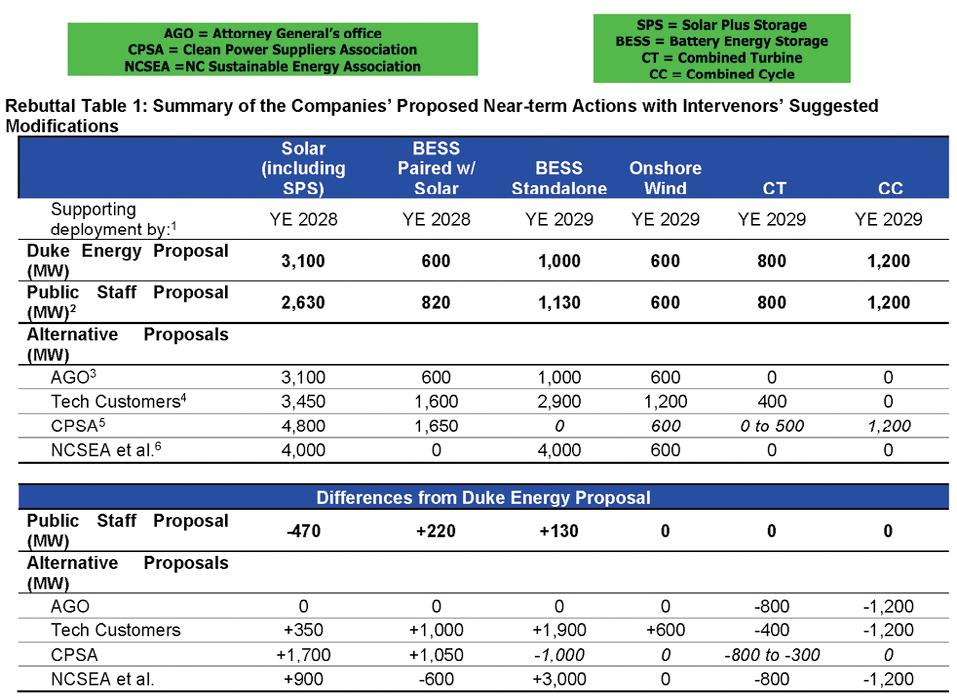
which requires 5,400 megawatts of solar to be online by the beginning of 2030. By lowballing the amount, “the Commission has made it extremely difficult” to achieve that target, CPSA wrote.
However, the public staff contended that that figure was unrealistic because of Duke’s transmission limits and costs. The staff contended “there must be an orderly transition from fossil fuel resources to renewable resources” and faults the CPSA and its contracted modeling for not factoring in greater costs.
Wind: it’s complicated
Unlike Iowa and Texas, where thousands of wind turbines dot their flat landscapes, North Carolina has just two onshore farms: a 208-megawatt facility in Perquimans and Pasquotank Counties owned by Amazon and the planned 189-megawatt facility in Chowan County, known as Timbermill. Both are in PJM territory, a regional transmission organization, and outside of Duke’s service area.
(A previous 18-month state moratorium on wind energy ended in December 2018. Trumpeted by former senator Harry Brown, a coastal Republican, the moratorium delayed the Timbermill project and derailed progress on developing this renewable resource.)
It’s unlikely that any onshore facility would be built in Duke Energy’s territory until at least 2029, and even then there are hurdles to clear. First, Carteret County has the greatest onshore wind potential, but it also lies within military flight paths, which complicates turbine siting. State law prohibits turbines on mountain ridges, so most blustery western regions are also off-limits.
Duke also has transmission constraints in parts of eastern North Carolina. That bottleneck is already limiting the amount of solar that can be passed on to other parts of the state. To accommodate wind power, Duke would have to significantly ramp up its transmission lines.
For offshore wind, the prospects are better, although these are long-term plans.
In 2017 Avangrid leased federal waters 27 miles offshore of Kitty Hawk, where it plans to build a 2,500-megawatt farm. Transmission requires the installation of undersea cables, and the current route burrows beneath the Pamlico Sound, which is likely a deal breaker. In that case, Avangrid would have to connect onshore at Virginia Beach, adding 100 miles and $350 million to the cost.
President Biden revoked the Trump administration’s 10-year moratorium on offshore wind leasing in the Southeast, including North Carolina. After the temporary ban was lifted, Duke Energy Renewables Wind successfully bid $155 million for 55,000 acres off Carolina Long Beach in Brunswick County. Total Energies, a French company, won a separate lease in the area.
Duke has to provide a site assessment to federal officials by June, with a construction and operations plan due in late 2026 or mid-2027.
Considering the eight to 10 years typically required for an offshore wind farm to begin commercial operation, the utilities commission determined that this is a long-term solution but not a near-term one.
INDYweek.com January 18, 2023 5
This table shows the proposed amount of megawatt hours for various energy types. Combined turbine and combined cycle use natural gas. CHART: UTILITIES COMMISSION CARBON PLAN
The nuclear option
Duke is asking the Nuclear Regulatory Commission (NRC) to extend its license for the existing nuclear plants in North Carolina: Brunswick, Shearon Harris, and McGuire.
The utility is also investigating the feasibility of small modular nuclear reactors. Small nuclear reactors are about a third of the size of a typical nuclear power plant. They are housed underground and can be built more quickly and cheaply than traditional reactors.
An early version of HB 951 allowed Duke to incur as much as $50 million for an early site permit from the NRC. That provision was later stripped from the measure.
However, none of these small reactors currently operate in the United States. NuScale, which builds the reactors, plans to deliver its first one to Utah in 2027. It’s not expected to go online until 2029. Even in its infancy that project has already come in well over budget—from $3 billion to $6 billion, according to a 2020 article in Scientific American.
Opponents also question their safety, especially in areas prone to flooding and earthquakes, as well as the disposal of nuclear waste.
Scientific American also reported that the NRC itself had safety concerns. One engineer discussed “boron dilution,” which means “that even if a reactor is shut down, fission reactions could restart and begin a dangerous power increase.”
Some clean energy advocates also opposed this technology in the Carbon Plan because it is “unproven and expensive, and will generate nuclear waste.”
Even Duke acknowledged these reactors are “not a mature technology and none is commercially operating.” To ramp one up by 2032 is an “aggressive schedule,” the plan reads.
Who pays for the Carbon Plan?
Duke wants to pass costs of the Carbon Plan along to ratepayers for its initial project development work for the following projects: new nuclear facilities, offshore wind, and pumped hydroelectric power. Current state law allows this early cost recovery only for nuclear plants. (It’s known as CWIP: Construction Work in Progress.)
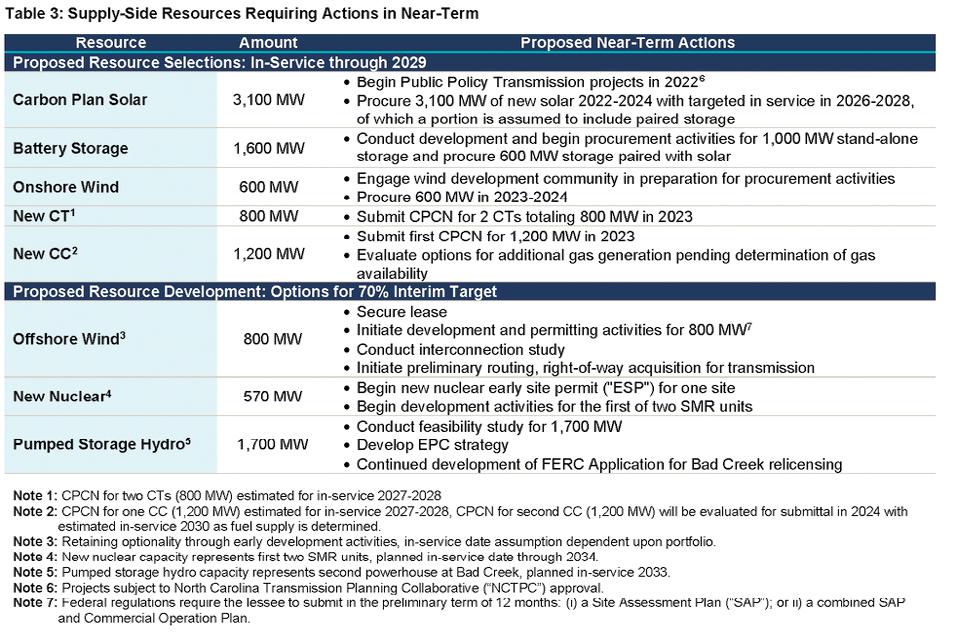
Duke warned that without some money up front, it “may not pursue some resources.”
Upcoming dates of interest
The utility has ample money to pay its top people. CEO Lynn Good raked in nearly $81.5 million between 2017 and 2021, according to a report released this week by the Energy and Policy Institute, a national watchdog group.
Duke’s pricing models did not include hefty tax cuts for energy producers that were included in the Inflation Reduction Act. Congress passed, and President Biden signed into law, the act in August, after Duke had completed its modeling.
Other federal actions could also alter costs and the overall marketplace. For example, the U.S. Environmental Protection Agency is scheduled to propose its revised Clean Power Plan in March. The agency also issued a proposal in November that would further limit methane emissions from natural gas operations.
That said, the utilities commission did approve Duke’s proposal to spend roughly $72 million to investigate nuclear power possibilities.
But in general, the commission declined to rule on “cost reasonableness and the prudence of Carbon Plan execution costs until formally presented at a hearing,” it wrote. “This is not a preapproval of cost recovery.”
Duke, not surprisingly, supported the Carbon Plan, as the utility received much of what it requested from the commission.
“We believe this is a constructive outcome that advances our clean energy transition, supporting a diverse, ‘all of the above’ approach that is essential for long-term resource planning,” the utility said in a prepared statement.
Clean energy advocates, though, felt deflated by the timidity of the plan, calling the order “disappointing.”
Duke Energy Progress rate increase hearings. The utility is requesting a 17.7% hike. All hearings start at 7 p.m.
Monday, March 6 – Haywood County Courthouse, 285 N. Main St., Waynesville
Tuesday, March 13 – Person County Courthouse, 105 S. Main St., Roxboro
Wednesday, March 14 – Dobbs Building, 430 N. Salisbury St., Raleigh
Tuesday, March 20 – Greene County Courthouse, 301 N. Greene St., Snow Hill
Wednesday, March 21 – Robeson County Courthouse, 500 N. Elm St., Lumberton
Duke is scheduled to file its interim Carbon Plan/Integrated Resource Plan no later than Sept. 1, 2023 The Utilities Commission’s next installment of its approved Carbon Plan is due by Dec. 31, 2024.
Joel Porter, policy director of CleanAIRE NC, said that while the plan includes “many commendable provisions,” it will likely miss the 2030 targets as set out in HB 951. “We have to be serious about lowering emissions,” Porter said.
That point was underscored by the National Oceanic and Atmospheric Administration this week. The climate crisis is increasing the chances of extreme weather, such as floods, wildfires, and heat waves. In the first 10 days of 2023, the California coast was drowned in relentless floods. And in Europe, seven countries reported all-time record highs, where midwinter has been as warm as summer. W
This story was originally published online at NC Policy Watch.
6 January 18, 2023 INDYweek.com
TABLE: UTILITIES COMMISSION CARBON PLAN

INDYweek.com January 18, 2023 7 Wake County Best Triangle 2023 of the Nominate your favorite Wake County bar, veterinarian, bookshop, museum—whatever it may be, there are over 100 categories in which you can profess your favorite Wake County treasures. Have no fear: Durham and Orange/ Chatham Counties will have their own nominations soon. Learn more about the updated Best of the Triangle For promotional opportunities, please contact sales@indyweek.com Wake County Nominations Begin Monday, February 1st The most recognized award throughout the Triangle is back for 2023— starting with Wake County!
A Prisoner of the Past
Derrick Allen was declared innocent of raping and killing a child, but he’s still imprisoned by his past.
BY THOMASI MCDONALD tmcdonald@indyweek.com
Derrick Allen was wrongly convicted of sexually assaulting and killing a child and spent nearly 13 years in prison for the horrific crimes. And while it has been seven years since Allen was last behind bars, he’s still imprisoned by his past.
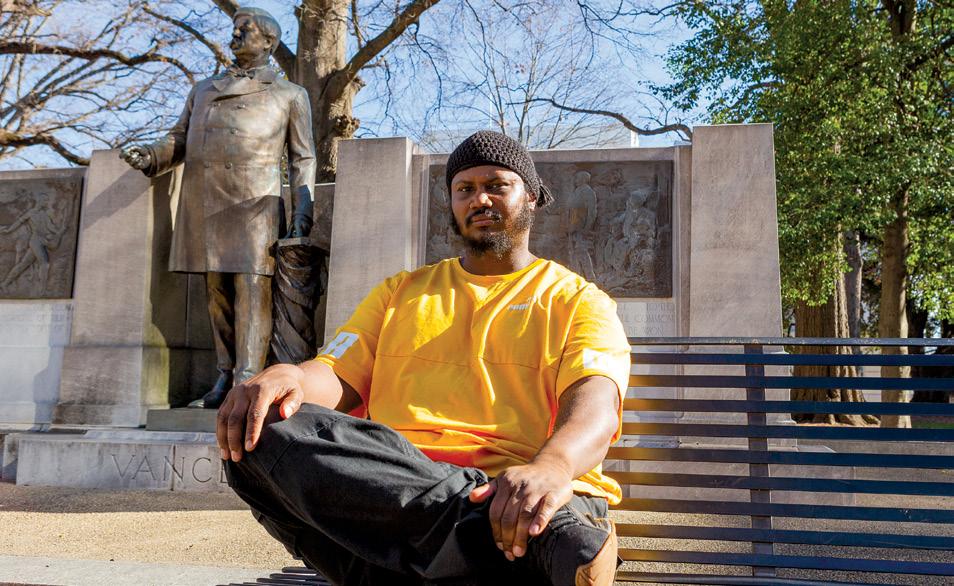
Although Allen’s criminal record was expunged, he says he hasn’t been able to find a job, nor can he find a place to live. He says local housing authority records indicated he was a sex offender. Most nights, he says, he sleeps in his car.
“I haven’t had an apartment since I was released in 2016,” Allen says.
Allen says he thinks his only recourse is a pardon of innocence from the governor.
Allen first filed for a pardon in 2016 with former governor Pat McCrory’s office. He then renewed the petition in 2017, after Gov. Roy Cooper was elected. He says he’s owed in excess of $600,000 for the nearly 13 years in prison and another $750,000 from the governor’s office.
“I need the money to relocate and move far away,” he says. The thought of continuing to live in Durham, indeed even the state, Allen says, is unbearable.
The governor’s spokesperson Sam Chan would not comment on Allen’s petition. Chan told the INDY that Cooper, the Office of Executive Clemency, and the Office of General Counsel “carefully review all applications for clemency.”
Chan added that Cooper has granted nine pardons of innocence while in office.
But in July 2020, a News & Observer editorial penned by a trio of Duke University law professors—Jamie Lau, Theresa Newman, and James E. Coleman Jr.—criticized Cooper, arguing that he was on track “to become the first North Carolina governor in more than 40 years to complete a term without granting clemency to a single person, which
includes sentence commutations and pardons of forgiveness or innocence.”
The concerns of the three faculty members with the Duke Law Center for Criminal Justice and Professional Responsibility mirrored Allen’s daily struggle to survive, sometimes from one moment to the next.
“These North Carolinians spent time in prison before a court overturned their convictions,” the law professors wrote. “Now they need a gubernatorial pardon to achieve full freedom. Without that, their arrests and years in prison remain barriers to finding employment and housing.”
The faculty members also took aim at what they described as the governor’s lack of transparency with the process, stating that his “office recently stopped releasing updated information on who and how many are seeking clemency.”
That was nearly three years ago. A cursory online check of the governor’s clemency office at the state Department of Public Safety website indicates the “page is currently under construction,” and visitors are asked to “please check back later for updates.”
On December 17, 2020, months after the law school faculty members’ editorial appeared in the N&O, Cooper’s office announced that the governor had granted five pardons of innocence: to Teddy Isbell, Damian Mills, Kenneth Kagonyera, Larry Williams Jr., and Ronnie Long.
The next year, Cooper announced pardons of innocence to Dontae Sharpe, Howard Dudley, and Darrell Howard.
Today Allen is bitter. The stocky, bearded man is wary of strangers. For him, a pardon from the governor is paramount.
He has laminated the news stories about his case and
has hundreds of documents in folders and envelopes or bound together with heavy black and silver metal clamps. His favorite phrase when talking about the law is “not guilty.”
In early 1998, Allen was attending night classes at Hillside High School when his judicial nightmare began to take shape. He says he had been dating Diane Jones for a few months. On February 9, Allen was watching his girlfriend’s two-year-old daughter, Adesha Jones, when she died from shaken baby syndrome. Allen called 911 and paramedics who arrived found the child dead with blood on the side of her clothing.
According to the National Registry of Exonerations, the paramedics also reported that what appeared to be blood on the inside leg of her pants. Allen reportedly told the emergency workers that Adesha had complained of leg pain and became unresponsive when he took her out of the bathtub. Allen was arrested hours after Adesha’s death.
The paramedics took Adesha to the hospital, but medical providers were unable to revive her, and an attending physician who examined the child reported there was a “fresh noticeable scar” in her vagina, “with some blood found inside the vagina and on the clothes [Adesha] wore to the hospital,” Ken Otterbourg wrote in the National Registry account of the case.
Allen told the police he did not assault the child. Still he was arrested the same day on one count each of first-degree murder, first-degree sexual offense, and felony child abuse.
Allen says he couldn’t believe he was in jail.
“I was a little discombobulated,” he adds. “I was there for, like, 16 months. It was horrible, man. They treated me like I was a child molester, and I wasn’t. They treated me worse in prison.”
8 January 18, 2023 INDYweek.com
N E W S
Derrick Allen in front of the Raleigh capitol PHOTO BY BRETT VILLENA
North Carolina
Allen doesn’t like to talk about what happened.
“I was targeted because I called the police,” he says. “I didn’t do anything to anyone. I was at the wrong place at the wrong time.”
Allen says police first took him to a hospital where his hands were swabbed for DNA and he submitted to a rape test.
“It all came back negative,” he says. But his court-appointed attorneys, including the county’s former chief public defender Robert Brown, told him that unless he accepted a plea deal, he would face the death penalty and die in the electric chair.
Otterbourg wrote that Allen was not the only person in the home with Adesha on the day she died. Diane Jones’s cousin Kia Ward had slept over the night before and had helped care for Adesha the day she died.
Ward told police that she noticed Adesha was “shaking—almost like she was having a seizure,” and when she asked Allen what was wrong with the child, he said he had been giving her a piggyback ride and she had fallen off. Ward also told police that she saw Allen changing the child’s underwear and asked him if he noticed the child was limping.
On February 29, Special Agent Mike Wilson with the NC State Bureau of Investigation (SBI) administered a lie detector test to Ward and determined that she was “not deceptive” in her responses to him and Durham police detective Dwight Gilliam. But Gilliam asked additional questions, and Ward told the detective that she had had sex with Allen two summers before, and they had since become “kind of like enemies,” Otterbourg wrote.
On March 2, 1998, a Durham grand jury indicted Allen on charges of first-degree murder and felony child abuse.
In 1999, Allen entered an Alford plea to second-degree murder and first-degree sexual offense to presiding superior court judge Leon Stanback. With the Alford plea, Allen did not admit actual guilt but acknowledged that prosecutors had enough evidence for a jury to find him guilty of the charges. Stanback sentenced Allen to 43 to 54 years in prison, but the 19-year-old escaped a death sentence.
Soon after going to prison, Allen began to fight his conviction. In 2004, Michael Dilworth, a jailhouse attorney who is now deceased, filed an appeal on Allen’s behalf that argued that his court-appointed attorneys failed to adequately represent him and that his sentence was overly severe.
In 2009, Allen’s appeal was granted by the NC Court of Appeals in March 2009 and allowed for a retrial of his case.
“[Dilworth] told me to get my Constitution down pat because when I got out [of prison], no one would touch my case. So I want to become an attorney, or a paralegal,” Allen says.
While awaiting retrial, Allen’s new attorney Lisa A. Williams discovered that prosecutors had withheld important information, including the child’s medical records and lab tests conducted by the SBI that countered claims of blood in the child’s underwear.
Meanwhile, Durham superior court judge Orlando Hud-
son vacated Allen’s sentence in 2010. But the Durham District Attorney’s Office appealed Hudson’s decision. The NC Court of Appeals overturned Hudson’s decision and remanded the case back to Durham’s superior court, where Allen would face another trial. He was released from prison on April 14, 2009, and held in custody at the Durham County jail before he was released on an unsecured bond on September 9, 2010.
While Allen awaited a potential retrial, the N&O chronicled his case in its series “Agents’ Secrets.” The paper reported that SBI agents in over 200 cases had “cut corners, bullied the vulnerable, and twisted reports and court testimony when the truth threatened to undermine their cases.” Reporters J. Andrew Curliss and Joe Neff wrote that Hudson vacated Allen’s 44-year sentence due to “widespread violations” of his rights.
ments from key witnesses, and the lie detector tests of those witnesses.
The prosecution’s case further blew all to hell when Hudson said assistant district attorney Tracey Cline, who worked alongside Black, was also found culpable in the withholding of evidence.
Black attracted national attention in 2003 as the prosecutor who convicted Michael Peterson in one of the biggest trials in the state’s history. She died in 2018 of end-stage liver disease aggravated by chronic alcoholism. She denied any wrongdoing in the Allen case.
Cline, on the other hand, would be removed as the county’s district attorney in March 2012, after a judge found she “made statements about Hudson with malice and reckless disregard for the truth.” Cline had filed court documents seeking to have Hudson removed from several cases, the N&O reported.
In June 2015 the NC State Bar suspended Cline’s law license for five years but also ruled the suspension would be active for two years and she could reapply to practice law after three years. Cline’s license was reinstated in 2018. Cline did not respond to the INDY’s requests for comment.
In 2016, prosecutors dismissed all of the charges against Allen.
In 2019, Allen, again representing himself, filed a complaint in the U.S. District Court of North Carolina against Black, Elwell, the SBI, and others involved in his prosecution. On October 6, 2021, federal judge Thomas Schroeder “dismissed most of the complaint, except for claims against Elwell,” Otterbourg reported.
On December 5, federal court records show that Schroeder dismissed Allen’s claim that Elwell fabricated evidence against him. Allen has continued the lawsuit by filing it with the federal court of claims and the U.S. Court of Appeals.
Hudson laid much of the blame on Freda Black, the county’s district attorney who prosecuted the case, and Jennifer Elwell, an SBI analyst.
Hudson stated that Elwell had not adequately disclosed written reports that a positive test indicated blood in the underwear the child was wearing when she died.
In August 2010, one month before Allen was released from prison, Cooper, then the state’s attorney general, commissioned an independent review of the SBI crime lab and “found that the lab’s analysts had routinely filed misleading reports that failed to adequately disclose negative results, often burying those contradictory findings in cryptically written lab notes,” Otterbourg wrote.
Otterbourg added that “the independent review found 230 cases, including Allen’s, where analysts didn’t adequately disclose the results of lab work.”
Hudson stated that Black had misled the court about the SBI lab test and withheld other evidence that would have been favorable to Allen, including state-
“They think I got off because I’m smart, like I got away with something,” Allen says. “There’s still no justice, and unless the governor steps in, I’m not going to get a fair shake.”
Allen enrolled at Durham Tech but was permanently suspended from the campus following an altercation with the police after another local news outlet aired his story.
He says that, from the time he was a 19-year-old going to night school to earn his diploma, Durham and the state of North Carolina has heaped injustice after injustice on his shoulders.
Allen says he doesn’t want a relationship with his 10-year-old son until he’s pardoned and relieved of accusations that he raped and killed a child.
“I don’t want to saddle him with that,” Allen says.
Allen supports himself by working part-time, Sunday through Thursday. He picks up trash and transports it to a dumpster. He earns $17 an hour and supplements his income by selling body oils and soaps out of his car. The $600 he earns each month wouldn’t even begin to cover the cost of an apartment, utilities, and food.
“No,” he says. “That’s not enough.” W
INDYweek.com January 18, 2023 9
“I was targeted because I called the police. I didn’t do anything to anyone. I was at the wrong place at the wrong time.”
State of Play
North Carolina and the Triangle will host the prestigious World University Games in 2029.
BY JASMINE GALLUP jgallup@indyweek.com
North Carolina may not be the location of choice for the Olympics (at least, not yet), but it’s about to host the next best thing—the World University Games, an international sports competition for elite college athletes.
The games, which occur every two years at locations around the globe, involve dozens of countries, hundreds of universities, and millions of tourists who pour into stadiums and arenas across the region to cheer for their favorite athletes.
Raleigh mayor Mary-Ann Baldwin made the surprise announcement at a work session last week, just after the International University Sports Federation (FISU) voted to approve North Carolina as the host for the 2029 summer games.
“I’m just thrilled. I’ve been waiting for the announcement to be confirmed,” Baldwin said. “We will have athletes from at least 150 universities throughout the world in Raleigh, Durham, Chapel Hill, and Greensboro. [It’s a] $150 million estimated economic impact. The largest event ever hosted by the state. It is huge.”
The Triangle region lost its bid for the 2027 games, but the team’s compelling pitch set the stage for this year’s victory, said Baldwin.
“When we went to Brussels [last year], unfortunately we were not awarded the [2027] games, but they hinted to us at that time, ‘What about 2029?’” the Raleigh mayor said. “I said, ‘You come with a contract, we’ll do it.’ Well, they signed the contract today.”
What are the games?
Like the Olympics, the World University Games has summer and winter competitions
for different sports. The winter competition includes skiing, figure skating, and ice hockey, while the summer competition includes gymnastics, swimming, and archery.
The summer games have 15 required events, including local staples like basketball, track and field, and tennis. FISU could also add three optional events for 2029, potentially baseball, rugby, and softball.
This year’s summer games, held in Chengdu, China, are expected to draw some 7,000 athletes who will compete in 18 sporting events over 12 days. The 2029 games in North Carolina are tentatively scheduled for July 13 to July 25, but those dates could change, according to Hill Carrow, chairman and CEO of the North Carolina Bid Committee.

This will be just the second time the United States has hosted the summer games. The last summer competition in the United States was in 1993, in Buffalo, New York. The winter games have also occasionally come to the United States. Lake Placid, New York, hosted the 1972 winter games and is hosting them again this year.
Student-athletes ages 18-25 will likely compete in some of the Triangle’s best sports complexes, including the WakeMed Soccer Park, Cary Tennis Park, and USA Baseball National Training Complex, all in Cary.
Over the last two decades, the town has poured more than $20 million into the construction and expansion of world-class sports complexes, drawing the attention of some national and international competition organizers. The WakeMed Soccer Park has been host to international friendlies as well as professional championships for men’s and women’s soccer.
And of course North Carolina is a bastion for college sports. Greensboro is home to the Atlantic Coast Conference (ACC) and
recently hosted the ACC men’s basketball tournament. North Carolina has also hosted the NCAA Men’s Basketball Final Four twice, once in Greensboro and once in Charlotte.
“As an event that features the best collegiate athletes from around the world, it is a natural fit for a state with 130 colleges and universities and more than 350,000 university students,” Carrow said.
What impact will it have on the state?
Like the Olympics, the World University Games requires local officials to join together in a massive organizational effort in the years before the games begin. Host cities are responsible for running the competition according to FISU guidelines, covering the on-site costs of staging the games, and accommodating the athletes, coaches, supporting staff, and officials who attend.
Guidelines for the games are unique to each city but do include some general requirements such as paying for insurance and medical care for the athletes and staff.
The local “organizing committee” is also responsible for providing transportation to and from venues, appropriate “sites, facilities, materials and equipment” for each event, interpreters for international delegations, and more than 20 guides and manuals for competitors, staff, and attendees, such as the athletes’ village map and competition schedule.
In return, the local organizing committee receives the revenue generated by ticket sales, national media coverage, national television broadcasting, and some national and international marketing and sponsorship. Overall, the games are expected to bring more than $150 million to North Carolina, according to Carrow.
The chairman compared it to a “major corporate relocation … but with the added benefits of significant international tourism and worldwide branding exposure for our state and local communities.”
“The award … is the culmination of an extensive five-year effort by more than 1,000 individuals, 13 universities, five cities, five counties, the state of North Carolina, and 53 corporate and organizational sponsors to land this amazing event,” Carrow said.
Arguably, the international exposure brought by the games is just as valuable as the revenue generated. An event like this could put North Carolina on the map as a destination for future sporting events, business headquarters, and tourists.
“Our state has world-class facilities, a great enthusiasm for college sports, and legendary southern hospitality that will make these games a success,” Gov. Roy Cooper tweeted last week.
The games could give North Carolina a “unique opportunity” to showcase the state, said Secretary of State Elaine Marshall, “including our renowned universities and all that our great state has to offer, to a worldwide audience of more than 400 million.” W
10 January 18, 2023 INDYweek.com
N E W S The Triangle
Runners compete in the World University Games. PHOTO BY POOL FOTOGRAFI UNIVERSIADI



INDYweek.com January 18, 2023 11 BILL BURTON ATTORNEY AT LAW Uncontested Divorce Music Business Law Incorporation/LLC/ Partnership Wills Collections 967-6159 SEPARATION AGREEMENTS UNCONTESTED DIVORCE MUSIC BUSINESS LAW INCORPORATION/LLC WILLS (919) 967-6159 bill.burton.lawyer@gmail.com Shop local! Love the indy? Support the businesses that support us...
Greensboro / Scrapmettle Entertainment | Jan. 19-22 | Hyers Theatre, Greensboro Cultural Center |
Nice Work
Durham playwright Tamara Kissane’s controversial new play hits the stage in Greensboro.
BY BYRON WOODS arts@indyweek.com
You probably know people like Cindy and Eric. They’re a politically liberal, white, middle-class couple who work from their home in the suburbs of a progressive Southern town, where their two kids go to the local public elementary school.
All things considered, they’re very nice.
And that, in itself, is the problem in a controversial— and award-winning—play, Nice White Parents 2016, by the Durham author and podcast host Tamara Kissane that sees its first production this weekend in Greensboro.
In a sign that regional playwrights are increasing in prominence, Kissane takes the same road west that Mike Wiley took last fall, when Greensboro’s Triad Stage commissioned and produced Rebellious, a historical drama dealing with the largely behind-the-scenes contributions that students at Bennett College, a Black women’s college, made to the famous sit-ins in that city.
In Kissane’s play, the year is 2016, and the country’s culture and politics are at a fundamental crossroads. As ongoing extrajudicial killings by law enforcement officers continue to fuel the Black Lives Matter movement, a growing populist and nationalist backlash among right-wing conservatives is ushering Donald Trump into the White House.
Locally, when a class of second graders does a march for Black lives around their school for a unit on civic activism, a distraught white parent posts a video about it on Facebook. The school is immediately inundated with hate mail and protests and the teachers receive death threats.
It’s a moment in which the community needs to take a stand. And when Cindy and Eric are unable at first to decide what that stand should be and how they should respond,
their friendship with Lorraine and Trevor, a Black couple, their relationship with their own children, and their own sense of ethics and integrity are all brought into question.
In Nice White Parents 2016, Kissane probes a dilemma similar to one Martin Luther King and others diagnosed in their writings during the 1960s: how white liberals, preoccupied more with civility than civil rights, have been at times one of the greatest impediments to achieving racial equity in our country.
“It was very uncomfortable to write this,” Kissane says. “In many ways, it was born out of the discomfort that I felt in 2016—discomfort with my own complicity.” In addition to being a longtime actor, playwright, and creator of the Artist Soapbox podcast who was named Piedmont Laureate in 2020, Kissane was very much a member of the title demographic in 2016.
“I was collecting all of these little interactions with people and the thoughts I had myself at the time,” she says, “because they really got under my skin.” At one point, the material covered her living room floor, as she attempted to reassemble, find connections and make sense of “things that were going on at the time for me, internally, but also externally in the world.”
During that time, Kissane recalls seeing “a lot of other people who looked like me struggling with the same issues” and calls her work “one way of trying to process, learn, and take responsibility for the discomfort I was feeling and not being OK with staying silent about it.”
The play caused a sensation when it was submitted to the North Carolina New Play Project, according to Todd Fisher, performing arts coordinator for Creative Greens-
boro, an initiative of the Greensboro city government.
“There’s this energy when there’s four dramatists in the room and they’re excited about one script,” Todd says. He remembers the panel feeling “this is hot, this is now, it needs to be seen by a North Carolina audience and it needs a North Carolina stage.”
Nice White Parents 2016 isn’t the first winner by a regional playwright in the project’s 29-year history. Works by Michael A. Smith, Mary Jett Parsley, and Justice Theater Project artistic director Jerry Sipp have taken top honors in the past. Winners receive an honorarium, a year of developmental time with feedback from Fisher and associates, and a public production at the end.
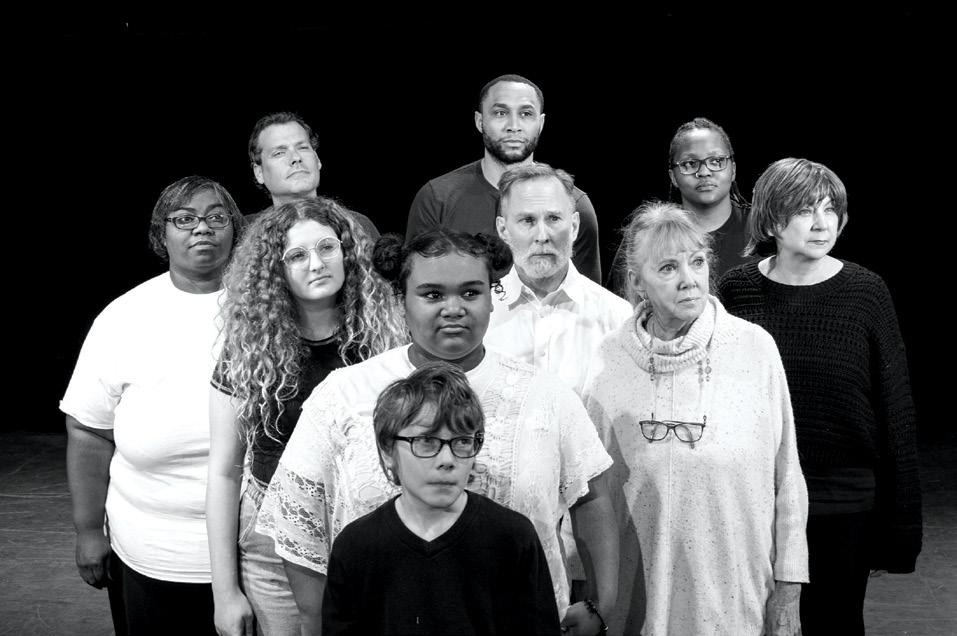
With Kissane, the developmental process included intense table readings and dialogue with Angela Williams Tripp and Kerri Mubaarak, the cofounders of Scrapmettle Entertainment, a network of writers, directors, and performing artists, which is coproducing the play.
Tripp says that the script reveals the subtleties of systemic racism.
“You’re not doing racist things, but you don’t realize that when you allow someone to do something wrong and you don’t step up and say anything about it, you’re playing into it,” Tripp says. “And that’s what keeps the circle going.”
As Kissane probes into the world of working parents living everyday lives, she parses the privilege that permits the white couple to distance, insulate, and disconnect themselves from the world that the Black couple has to navigate directly. As Nice White Parents 2016 develops, it becomes increasingly obvious that Cindy and Eric fundamentally do not understand what they’ve been missing.
12 January 18, 2023 INDYweek.com
NICE
A photo from Nice White Parents 2016 PRESS PHOTO BY SAM MCCLENAGHAN PARENTS 2016
STAG
E
WHITE
Creative
$10 suggested | Creativegreensboro.com
EVENTS



Culley Holderfield, Hemlock Grove In conversation with Heather Bell Adams


Grady Hendrix, How to Sell a Haunted House

“I really wanted to dig into this idea that intention does not negate impact—that saying ‘I didn’t know’ or ‘I didn’t mean to’ only goes so far. Good intentions are not sufficient. In this case, white people need to take responsibility and educate themselves,” Kissane says.
She views her play as “kind of a snapshot of a reckoning” that started with her before 2016 but “really, really got into my gut then, and has continued since.”
Recalling the words of bell hooks that “love is an action,” Kissane says that “our ability to dance around in our language and give lip service—that needs closer examination. If you’re just going to say words but not follow up with action, then the words are, well, meaningless.”

“It’s easy to say, ‘Oh well, I’m an ally,’” Kissane continues. “But what does that really mean? Even if you intend to be one, you certainly aren’t one 100 percent of the time. Can you accept that as a white person or a white parent, process the emotions that come up around that, and move on? Because it’s not about you.” W

Chasta Hamilton, Handle the Horrible

Brother Luck, No Lucks Given Mesha Maren, Perpetual West

13
INDYweek.com January 18, 2023
WED 1.18 7 PM THUR 1.19 7 PM SUN 1.22 2 PM MON 1.23 7 PM TUES 1.24 7
Raleigh's Community Bookstore www.quailridgebooks.com Register for Quail Ridge Books Events Series at www.quailridgebooks.com • 919.828.1588 • North Hills 4209-100 Lassiter Mill Road, Raleigh, NC 27609 FREE Media Mail shipping on U.S. orders over $50
PM
The playwright Tamara Kissane
PHOTO BY ERIN BELL
“It’s easy to say, ‘Oh well, I’m an ally. But what does that really mean? Even if you intend to be one, you certainly aren’t one 100 percent of the time.”
By the Margins
Mesha Maren’s expansive second novel, Perpetual West, takes readers from Appalachia to the southern border. To write it, she had to lean into both empathy and doubt.
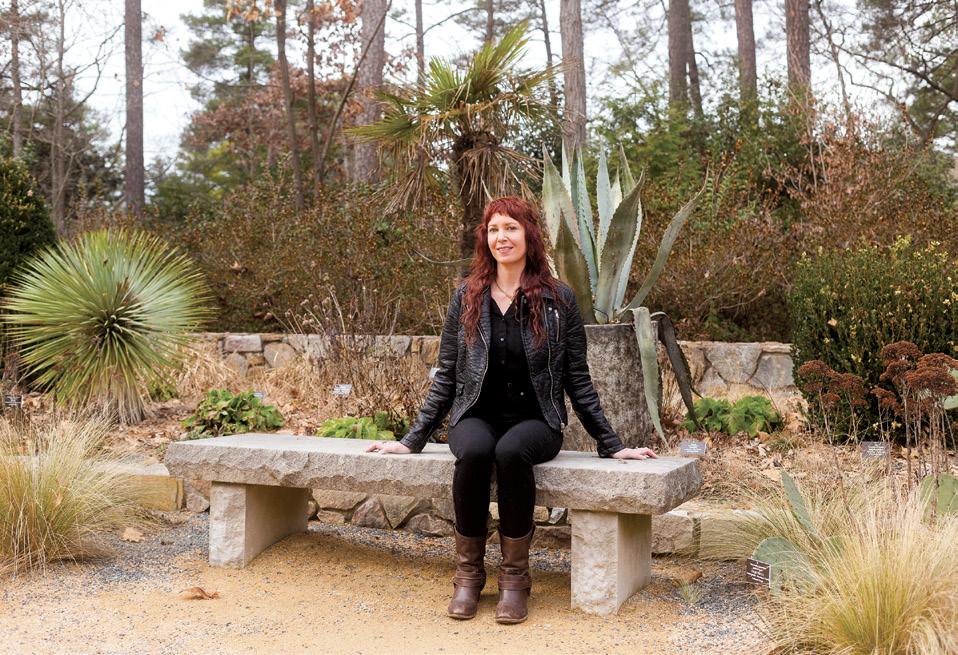 BY SARAH EDWARDS sedwards@indyweek.com
BY SARAH EDWARDS sedwards@indyweek.com
“T he older I get and the more that I write, the more that I think that doubt can be your best friend,” Mesha Maren says, “and that empathy and doubt can have a good relationship.”
Maren says this one gray January afternoon from a bench at Duke Gardens, near her office on Duke University’s campus. It’s a few days out from the paperback release of her second novel, Perpetual West, first released in hardback by Algonquin in January 2022, and the dust is beginning to settle—both for the book’s publicity cycle and for Maren, who moved to Durham in the fall of 2019, right before the pandemic, to start a job in Duke’s English Department.
Maren wrote her first novel, Sugar Run, while waiting tables in Iowa City while her partner was attending graduate school. After sending the manuscript to a former teacher, the writer Lauren Groff—whom Maren calls a “literary fairy godmother”—
the book found an agent, and then editors, and then sweeping acclaim, with a New York Times review by Charles Frazier praising Maren’s writing as a “recompense for a world that presses up against you all raw and aggressive and dangerous.”
Sugar Run was set in Appalachia, and Perpetual West takes readers farther south and then back again, following Alex and Elana, a young married couple moving for grad school from West Virginia to the bordering towns of El Paso and Juárez. The novel, which clocks out at an expansive 370 pages, slips gracefully between those places, with Alex comparing them at one point and observing that he had “thought vertically all his life, but here it flipped. The land rushed out away from you, both endless and dissipating.”
Alex, who is Mexican and was adopted as a baby by white American Pentecostal missionaries, is intent on connecting with both his birthplace and Mateo, the Lucha Libre fighter
he has secretly fallen in love with—and who is, unbeknownst to Alex, sponsored by the leader of a powerful drug cartel. Meanwhile, Elana, disillusioned with academia, is waitressing, suffering from an eating disorder, and receding into herself and away from Alex. (A note of caution here: the descriptions of Elana’s anorexia are particularly evocative and may be difficult for some readers.)
When Elana goes home to West Virginia to see her younger brother, who is home from rehab for meth addiction, Alex takes a trip with Mateo and goes missing. Here, the pulse of the book picks up and turns into something close to a thriller.
Maren is a stylish and sensual writer, stretching an elastic suspension between the cerebral preoccupations of the characters and its noir, violence-inflected center. The titular idea of a “perpetual west” is one that Elana and Alex both grapple with, as strangers to a border that, as Elana observes, has primarily functioned in the American literary and historical imagination as a “final and perpetual frontier, a place of eternal contrast that America can always compare itself favorably to,” with “Mexico as the ultimate crucible for the formation of individual identity, a great plow to break yourself against and find out who you really are.”
Maren, who was born in Greenbriar, West Virginia, followed her own love interest to El Paso in the early 2000s, where she fell in with a leftist activist circle similar to the one in which Alex and Elana run. It was a formative period, she says, but one that required her to “live more life before I could really understand it.” Those attempts to understand it also required years of research—Maren started writing Perpetual West between 2015 and 2016—involving everything from returning to El Paso and Juárez to training at a boxing gym in Greensboro to better understand Lucha Libre and the feel of a boxing ring. Research also required a perpetual awareness about, Maren says, “what it means to write a novel about a place that does not belong to me.”
Empathy and doubt, or the ability to place curiosity above ego, are key here. I like the novelist Brandon Harris’s definition of empathy, from a 2016 LitHub essay—“writing requires you to enter into the lives of other people, to imagine circumstances as varied, as mundane, as painful, as beautiful, and as alive as your own”—and Maren’s is effective, too: “I think of it as a muscle that you build up through asking questions and not being afraid to doubt yourself.”
In this case, the process of asking questions led Maren to recognize the ways that Mexico acted as a crucible for her own characters, as well as parallels between the transience of the border and West Virginia, a place that, as Elana observes, is in “a continuous state of being left.”
The book is strongest in these moments of subtle parallel. Like Cormac McCarthy (who was raised in Tennessee and also ended up in El Paso), Maren is interested in the hinterlands of Southern literary traditions—the margins between borders and repudiated mountains, and the margins between the selves we present to the world and those we long to understand and have known. In Perpetual West, both are rendered with care. W
14 January 18, 2023 INDYweek.com
Mesha Maren
PHOTO BY BRETT VILLENA
MESHA MAREN READINGS
PAG E
[McIntyre’s Books | January 21, 11 a.m. | Pittsboro] [Quail Ridge Books | January 24, 7 p.m. | Raleigh]


INDYweek.com January 18, 2023 15
Literary Luminary
BY THOMASI MCDONALD tmcdonald@indyweek.com
Dasan Ahanu has been called “a poet’s poet” and “the Triangle’s leading light” of the art form.
Let it also be said: Dasan Ahanu is a great poet.
Over the years, Ahanu, also known as Christopher Massenburg, has used his distinctive voice as a poet and community organizer to slash and burn and nurture and cultivate his own path of personal development—and to create a greater appreciation for the art form.
This month, he was appointed as the 15th Piedmont Laureate, the second Black artist named to the post since the state’s current poet laureate, Jaki Shelton Green, was selected in 2009.
“I was really excited,” Ahanu says. “Jaki was the first [Black poet selected], and she has been a guiding light.”
The Piedmont Laureate program is a partnership between the City of Raleigh Arts Commission, Durham Arts Council, Orange County Arts Commission, and United Arts Council of Raleigh and Wake County. Now in its 14th year, the program runs the literary gamut, featuring writers of poetry, fiction, nonfiction, children’s literature, and plays. Past recipients include Heather Bell Adams, Kelly Starling Lyons, David Menconi, and Ian Finley.
The author of four poetry collections, Ahanu is best known around Durham for his landmark work as the resident artist with the Hayti Heritage Center and as the creator of the Jambalaya Soul poetry series. He is a founding member and coach of the nationally acclaimed Bull City Slam Team, and a cofounder and managing director of the city’s Black Poetry Theatre. He’s also a past recipient of the Nasir Jones Fellowship with the Hiphop Archive at Harvard University’s Hutchins Center for African and African American Research and is currently a visiting profes-
sor at UNC-Chapel Hill, where he teaches courses on hip-hop and Black culture.
Ahanu—a driving force behind the creation of Durham’s own poet laureate program—has promised to release a chapbook in the coming months to honor his laureate appointment. He’s also shopping around his next collection of poems that will include the powerful “Ash and Soot,” a poem he wrote after the police murder of George Floyd that ignited 2020’s Black Lives Matter protests.
“Ash and Soot”—a reference pointing to the historical preponderance of white supremacists burning crosses as a means of intimidation—was one of the poems Ahanu shared with a near-capacity audience that gathered for his inaugural reading as Piedmont Laureate on January 1 at the Eno River Arts Mill in Hillsborough.
Ahanu’s poetry is like fire: sometimes a roaring blaze, in other instances a fireplace warming the heart and spirit, or a single candle that illuminates the mind and guides us along our respective journeys. It astounds in its richness of metaphor and is relentless in its quest to present gifts of love and insight, family and value, nuance and affirmations of spirituality.
In “Conversation with God,” Ahanu writes: “My God has watched this world bend his name to its will and call it conviction / Seen men put him to work as gospel for a privatized prosperity / We are not speaking to the same person.”
A Raleigh native now living in Durham, Ahanu describes himself as a Black Southern poet and credits opportunities to travel as motivation for honing his craft. It’s imperative to “show up and represent,” Ahanu says, and put to rest assumptions of the South as a place saturated with anti-intellectualism.

“I am Southern. I am Black. I am an artist. I walk in a rich, beautiful, and powerful
tradition,” Ahanu writes in his introduction to his latest poetry collection, Shackled Freedom. “The South made me, raised me, and gave me my platform.”
The foreword to Shackled Freedom was written by Michael Harriot, the acclaimed and ridiculously funny columnist at The Root
“He didn’t yell, nor did he whisper,” Harriot writes of the first time he encountered Ahanu, at the Southern Fried Poetry Festival. “He wasn’t extremely militant (which I expected because … Come on. His name is ‘Dasan Ahanu’). Instead, he just writes good poetry.”
Harriot also noted that many discussions about activism, social justice, and art are typically “mired in the bespattered muck of Black pain.”
I later asked Ahanu about Harriot’s observation.
“A lot of Black artists wear their sensibility as a part of their [selfhood],” he said. “I started with the same sensibility. But the OGs I looked up to said, ‘No. We can tell the politics that informs the decision-making in your work.’”
Ahanu, who stands at around 6 foot 5, drinks deeply from the well of wisdom offered by Black women. His poem “Change Tin” tells the story of an enduring lesson his grandmother taught him about reciprocity and the consequences of taking and not giving back, while
“Black Holiness” may be the ultimate poetic statement about the magic of growing up around Black women. Ahanu praises Black queer women who have had to “push through to stand in solidarity” and notes that many of the invitations he’s received to share his work throughout communities or in classrooms have been at the behest of Black women.
“Those opportunities have shaped me,” he says. “But those opportunities are tied to Black women.”
During Ahanu’s one-year appointment, his duties across Durham, Orange, and Wake Counties include presiding over poetry readings at libraries, schools, and other community settings. He will also conduct workshops to foster an appreciation for creative writing and help organize literary events in “less traditional settings,” according to the Piedmont Laureate website.
Ahanu says that “working with all of these organizations in the broader region requires a lot of work” but that he’s looking forward to sitting down at the table with members of the partner organizations to help create intergenerational activities. He wants to develop projects where all of the participating groups are stakeholders, both in the process and outcomes.
“Of course, there will be readings to bring poets together,” he says. “I want to provide opportunities to talk about all the things about the art.” W
16 January 18, 2023 INDYweek.com
New Piedmont Laureate Dasan Ahanu ushers in a new era with poetry that burns bright.
PAG E
Piedmont Laureate Dasan Ahanu. PHOTO BY STAN CHAMBERS JR.
stage
Come from Away $31+. Jan. 19-22, various times. DPAC, Durham.
Giggly Squad Live $33+. Thurs, Jan. 19, 7 p.m. The Carolina Theatre, Durham.
A Steady Rain $25. Jan. 21-Feb. 4, various times. Theatre Raleigh, Raleigh.
The Other Half: A New Play by Mark Cornell $10. Jan. 12-22, various times. The ArtsCenter, Carrboro.
The Monti Story SLAM $12. Thurs, Jan. 19, 7:30 p.m. Motorco Music Hall, Durham.
Comedy Night with JJ Barrows and JD Scranton $15. Fri, Jan. 20, 8 p.m. The Cary Theater, Cary.
Shen Yun Performing Arts $41+. Jan. 21-22, various times. Duke Energy Center for the Performing Arts, Raleigh.
JB Smoove: Physical Therapy Tour $31+. Sat, Jan. 21, 8 p.m. The Carolina Theatre, Durham.
art
music
123 Andrés $5+. Jan. 20-21, various times. The Carolina Theatre, Durham.
Eno House Artist’s Den: Songwriters in the Round with Jess Klein, Jared Place, and Abigail Dowd $15. Wed, Jan. 18, 7 p.m. The Eno House, Hillsborough.
Spafford $25. Wed, Jan. 18, 8:30 p.m. Lincoln Theatre, Raleigh.
Hammered Hulls $15. Thurs, Jan. 19, 8:30 p.m. Cat’s Cradle Back Room, Carrboro.
Sweet Home $10. Thurs, Jan. 19, 8:30 p.m. Local 506, Chapel Hill.
Aretha: A Tribute with the North Carolina Symphony $50+. Jan. 20-21, various times. Duke Energy Center for the Performing Arts, Durham.
’80s vs. ’90s featuring Joe Hero and Rockzilla $11. Fri, Jan. 20, 8 p.m. Lincoln Theatre, Raleigh.
Chuck Prophet Trio $22. Fri, Jan. 20, 8 p.m. Cat’s Cradle Back Room, Carrboro.
Double Date with Tierney and Kate $40. Fri, Jan. 20, 7 and 9 p.m. Sharp Nine Gallery, Durham.
Evening Pines $6. Fri, Jan. 20, 9 p.m. Local 506, Chapel Hill.
Jonathan Bagg with Mimi Solomon and Ilana Davidson Fri, Jan. 20, 7:30 p.m. Baldwin Auditorium, Durham.
Town Mountain $15. Fri, Jan. 20, 8 p.m. Cat’s Cradle, Carrboro.
The Bronze Age $10. Sat, Jan. 21, 8 p.m. Local 506, Chapel Hill.
Cosmic Charlie: High Energy Grateful Dead $15. Sat, Jan. 21, 8:30 p.m. Cat’s Cradle, Carrboro.
Emanuel Wynter $10. Sat, Jan. 21, 7 p.m. The Pinhook, Durham.

Read Southall Band $18. Sat, Jan. 21, 8 p.m. Motorco Music Hall, Durham.
Southern Songbirds: An Evening with Rissi Palmer $27. Sat, Jan. 21, 7 p.m. North Carolina Museum of History, Raleigh.
Tierney Sutton & Serge Merlaud: Paris Sessions $40. Sat, Jan. 21, 7 and 9 p.m. Sharp Nine Gallery, Durham.
Weekend Excursion $12. Sat, Jan. 21, 8 p.m. Lincoln Theatre, Raleigh.
Quarters of Change SOLD OUT. Sun, Jan. 22, 8 p.m. Cat’s Cradle Back Room, Carrboro.
Tenci $12. Mon, Jan. 23, 8 p.m. The Pinhook, Durham. Ciompi Quartet: Portfolio Project 2022 Tues, Jan. 24, 5:30 p.m. Rubenstein Arts Center, Durham.
Night Moves $15. Tues, Jan. 24, 8 p.m. Cat’s Cradle Back Room, Carrboro.
Staff-Guided Tour of True Likeness Thurs, Jan. 19, 6 p.m. Gregg Museum of Art & Design, Raleigh.
Opening Reception—Bailey Knight: Colors of the Earth Fri, Jan. 20, 5:30 p.m. The Crafts Center at NC State University, Raleigh.
Third Friday Reception—Winter Wonders: Gallery Members Exhibit Fri, Jan. 20, 6 p.m. 5 Points Gallery, Durham.
Artspace Winter Family Day Sat, Jan. 21, 11 a.m. Artspace, Raleigh.
Paint Like Van Gogh Workshop $77+. Sat, Jan. 21, 11 a.m. Van Gogh Immersive Experience, Raleigh.
page
Grady Hendrix: How to Sell a Haunted House Thurs, Jan. 19, 7 p.m. Quail Ridge Books, Raleigh.
Chasta Hamilton: Handle the Horrible Sun, Jan. 22, 2 p.m. Quail Ridge Books, Raleigh.
Culley Holderfield: Hemlock Hollow Wed, Jan. 18, 7 p.m. Quail Ridge Books, Raleigh.
Joanna “Jo” Sisk-Purvis: The Watchers Thurs, Jan. 19, 5:30 p.m. Flyleaf Books, Chapel Hill.
Mesha Maren: Perpetual West Tues, Jan. 24, 7 p.m. Quail Ridge Books, Raleigh.
Michael McFee: A Long Time to Be Gone Tues, Jan. 24, 5:30 p.m. Flyleaf Books, Chapel Hill.
INDYweek.com January 18, 2023 17
Emanuel Wynter performs at The Pinhook on Saturday, January 21
PHOTO COURTESY OF THE PINHOOK
like to plan ahead? FOR OUR COMPLETE COMMUNITY CALENDAR: INDYWEEK.COM like to ahead? C U LT U R E CA L E N DA R Please check with local venues for their health and safety protocols.

EMPLOYMENT


Quality Test Engineer III

sought by LexisNexis USA in Raleigh, NC to develop & execute automated & performance testing for assigned projects to successfully & consistently enable delivery of high-quality software products & services on time, on budget & to specification. Minimum of Bachelor’s degree or foreign equiv in Computer Science or rltd + 3 yrs exp in job offered or rltd required. EE reports to LexisNexis USA office in Raleigh, NC but may telecommute from any location within US. Interested candidates apply by mail to T. Hayward, RELX Inc, 1100 Alderman Dr, Alpharetta, GA 30005
Software Engineer III

sought by LexisNexis USA in Raleigh, NC to contribute to the research & design for software development assignments in various development environments such as Agile & Waterfall for specific software functional areas & product lines. Minimum of Master’s degree or foreign equiv in Computer Science or rltd + 2 yrs exp in job offered or rltd required. EE reports to LexisNexis USA office in Raleigh, NC but may telecommute from any location within US. Interested candidates apply by mail to T. Hayward, RELX Inc; 1100 Alderman Dr, Alpharetta, GA 30005
EA BI Engineer RAQA (EBER-GRG) Intuitive Surgical Operations, Inc. is seeking an EA BI
INDY CLASSIFIEDS classy@indyweek.com CLASSIFIEDS HEALTH & WELL BEING
919-416-0675 www.harmonygate.com
data
ted,
sive rltd
Engineer RAQA (EBER-GRG) in Raleigh, NC. Design of
pipelines and Data models. Telecommuting permit-
must report to 901 Main Campus Dr., #100, Raleigh, NC 27606 office location. Req BS followed 5 yrs progres-
exp or MS+2 yrs exp. $127,774.00 - $154,500.00/year. Email resumes to Hien.Nguyen@ intusurg.com. Must reference job title & job code: EBERGRG in subject line.
software
Management,
Data
RECYCLE THIS PAPER LAST WEEK’S PUZZLE SERVICES
Software Developers Software Developers: MS in comp. sc related. 1 yr. expr in
dev. Expertise Enterprise Data & Information
I.T. Infrastructure, Adv. DB Management,
ware housing, Informatica Power Center, ETL process, SQL Queries, OBIEE, PL/SQL procedures. Travel/ Reloc. Resumes to: Attn: H.R. D2SOL Inc., 5920 S Miami Blvd, Suite 101, Morrisville, NC 27560

























 BY SARAH EDWARDS sedwards@indyweek.com
BY SARAH EDWARDS sedwards@indyweek.com









